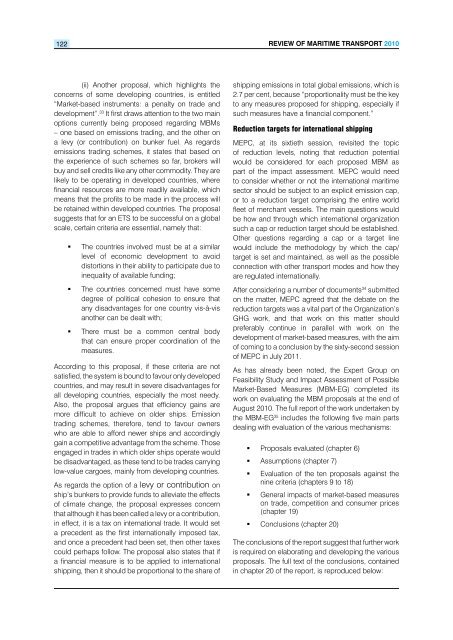Review of Maritime Transport 2010 - Unctad
Review of Maritime Transport 2010 - Unctad
Review of Maritime Transport 2010 - Unctad
Create successful ePaper yourself
Turn your PDF publications into a flip-book with our unique Google optimized e-Paper software.
122<br />
(ii) Another proposal, which highlights the<br />
concerns <strong>of</strong> some developing countries, is entitled<br />
“Market-based instruments: a penalty on trade and<br />
development”. 33 It first draws attention to the two main<br />
options currently being proposed regarding MBMs<br />
– one based on emissions trading, and the other on<br />
a levy (or contribution) on bunker fuel. As regards<br />
emissions trading schemes, it states that based on<br />
the experience <strong>of</strong> such schemes so far, brokers will<br />
buy and sell credits like any other commodity. They are<br />
likely to be operating in developed countries, where<br />
financial resources are more readily available, which<br />
means that the pr<strong>of</strong>its to be made in the process will<br />
be retained within developed countries. The proposal<br />
suggests that for an ETS to be successful on a global<br />
scale, certain criteria are essential, namely that:<br />
� The countries involved must be at a similar<br />
level <strong>of</strong> economic development to avoid<br />
distortions in their ability to participate due to<br />
inequality <strong>of</strong> available funding;<br />
� The countries concerned must have some<br />
degree <strong>of</strong> political cohesion to ensure that<br />
any disadvantages for one country vis-à-vis<br />
another can be dealt with;<br />
� There must be a common central body<br />
that can ensure proper coordination <strong>of</strong> the<br />
measures.<br />
According to this proposal, if these criteria are not<br />
satisfied, the system is bound to favour only developed<br />
countries, and may result in severe disadvantages for<br />
all developing countries, especially the most needy.<br />
Also, the proposal argues that efficiency gains are<br />
more difficult to achieve on older ships. Emission<br />
trading schemes, therefore, tend to favour owners<br />
who are able to afford newer ships and accordingly<br />
gain a competitive advantage from the scheme. Those<br />
engaged in trades in which older ships operate would<br />
be disadvantaged, as these tend to be trades carrying<br />
low-value cargoes, mainly from developing countries.<br />
As regards the option <strong>of</strong> a levy or contribution on<br />
ship’s bunkers to provide funds to alleviate the effects<br />
<strong>of</strong> climate change, the proposal expresses concern<br />
that although it has been called a levy or a contribution,<br />
in effect, it is a tax on international trade. It would set<br />
a precedent as the first internationally imposed tax,<br />
and once a precedent had been set, then other taxes<br />
could perhaps follow. The proposal also states that if<br />
a financial measure is to be applied to international<br />
shipping, then it should be proportional to the share <strong>of</strong><br />
<strong>Review</strong> <strong>of</strong> MaRitiMe tRanspoRt <strong>2010</strong><br />
shipping emissions in total global emissions, which is<br />
2.7 per cent, because “proportionality must be the key<br />
to any measures proposed for shipping, especially if<br />
such measures have a financial component.”<br />
Reduction targets for international shipping<br />
MEPC, at its sixtieth session, revisited the topic<br />
<strong>of</strong> reduction levels, noting that reduction potential<br />
would be considered for each proposed MBM as<br />
part <strong>of</strong> the impact assessment. MEPC would need<br />
to consider whether or not the international maritime<br />
sector should be subject to an explicit emission cap,<br />
or to a reduction target comprising the entire world<br />
fleet <strong>of</strong> merchant vessels. The main questions would<br />
be how and through which international organization<br />
such a cap or reduction target should be established.<br />
Other questions regarding a cap or a target line<br />
would include the methodology by which the cap/<br />
target is set and maintained, as well as the possible<br />
connection with other transport modes and how they<br />
are regulated internationally.<br />
After considering a number <strong>of</strong> documents 34 submitted<br />
on the matter, MEPC agreed that the debate on the<br />
reduction targets was a vital part <strong>of</strong> the Organization’s<br />
GHG work, and that work on this matter should<br />
preferably continue in parallel with work on the<br />
development <strong>of</strong> market-based measures, with the aim<br />
<strong>of</strong> coming to a conclusion by the sixty-second session<br />
<strong>of</strong> MEPC in July 2011.<br />
As has already been noted, the Expert Group on<br />
Feasibility Study and Impact Assessment <strong>of</strong> Possible<br />
Market-Based Measures (MBM-EG) completed its<br />
work on evaluating the MBM proposals at the end <strong>of</strong><br />
August <strong>2010</strong>. The full report <strong>of</strong> the work undertaken by<br />
the MBM-EG 35 includes the following five main parts<br />
dealing with evaluation <strong>of</strong> the various mechanisms:<br />
� Proposals evaluated (chapter 6)<br />
� Assumptions (chapter 7)<br />
� Evaluation <strong>of</strong> the ten proposals against the<br />
nine criteria (chapters 9 to 18)<br />
� General impacts <strong>of</strong> market-based measures<br />
on trade, competition and consumer prices<br />
(chapter 19)<br />
� Conclusions (chapter 20)<br />
The conclusions <strong>of</strong> the report suggest that further work<br />
is required on elaborating and developing the various<br />
proposals. The full text <strong>of</strong> the conclusions, contained<br />
in chapter 20 <strong>of</strong> the report, is reproduced below:

















